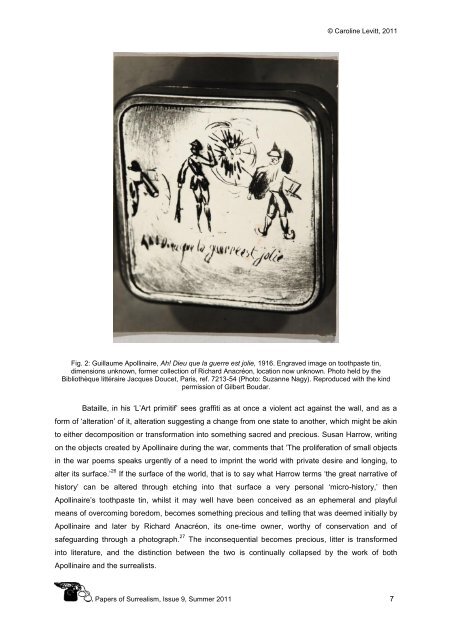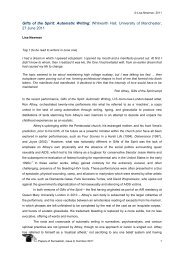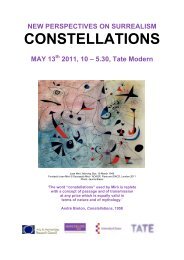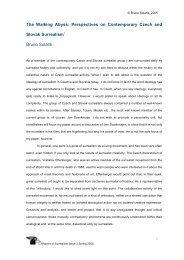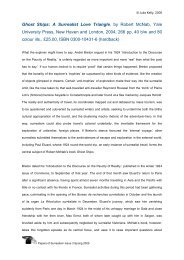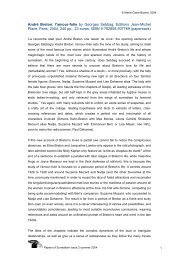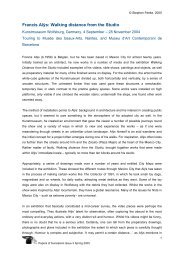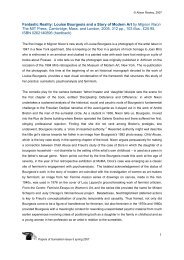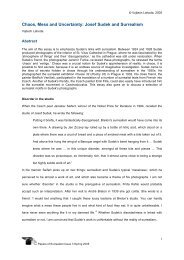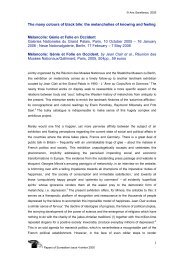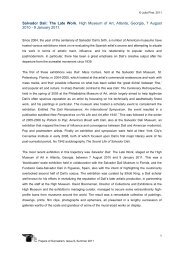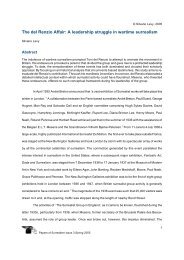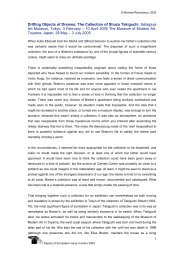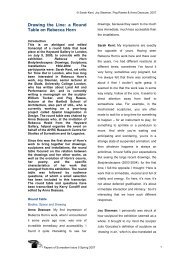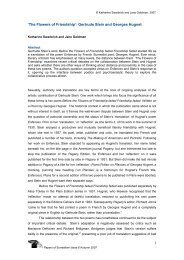From the Walls of Factories to the Poetry of the Street: Inscriptions ...
From the Walls of Factories to the Poetry of the Street: Inscriptions ...
From the Walls of Factories to the Poetry of the Street: Inscriptions ...
Create successful ePaper yourself
Turn your PDF publications into a flip-book with our unique Google optimized e-Paper software.
© Caroline Levitt, 2011<br />
Fig. 2: Guillaume Apollinaire, Ah! Dieu que la guerre est jolie, 1916. Engraved image on <strong>to</strong>othpaste tin,<br />
dimensions unknown, former collection <strong>of</strong> Richard Anacréon, location now unknown. Pho<strong>to</strong> held by <strong>the</strong><br />
Bibliothèque littéraire Jacques Doucet, Paris, ref. 7213-54 (Pho<strong>to</strong>: Suzanne Nagy). Reproduced with <strong>the</strong> kind<br />
permission <strong>of</strong> Gilbert Boudar.<br />
Bataille, in his „L‟Art primitif‟ sees graffiti as at once a violent act against <strong>the</strong> wall, and as a<br />
form <strong>of</strong> „alteration‟ <strong>of</strong> it, alteration suggesting a change from one state <strong>to</strong> ano<strong>the</strong>r, which might be akin<br />
<strong>to</strong> ei<strong>the</strong>r decomposition or transformation in<strong>to</strong> something sacred and precious. Susan Harrow, writing<br />
on <strong>the</strong> objects created by Apollinaire during <strong>the</strong> war, comments that „The proliferation <strong>of</strong> small objects<br />
in <strong>the</strong> war poems speaks urgently <strong>of</strong> a need <strong>to</strong> imprint <strong>the</strong> world with private desire and longing, <strong>to</strong><br />
alter its surface.‟ 26 If <strong>the</strong> surface <strong>of</strong> <strong>the</strong> world, that is <strong>to</strong> say what Harrow terms „<strong>the</strong> great narrative <strong>of</strong><br />
his<strong>to</strong>ry‟ can be altered through etching in<strong>to</strong> that surface a very personal „micro-his<strong>to</strong>ry,‟ <strong>the</strong>n<br />
Apollinaire‟s <strong>to</strong>othpaste tin, whilst it may well have been conceived as an ephemeral and playful<br />
means <strong>of</strong> overcoming boredom, becomes something precious and telling that was deemed initially by<br />
Apollinaire and later by Richard Anacréon, its one-time owner, worthy <strong>of</strong> conservation and <strong>of</strong><br />
safeguarding through a pho<strong>to</strong>graph. 27 The inconsequential becomes precious, litter is transformed<br />
in<strong>to</strong> literature, and <strong>the</strong> distinction between <strong>the</strong> two is continually collapsed by <strong>the</strong> work <strong>of</strong> both<br />
Apollinaire and <strong>the</strong> surrealists.<br />
Papers <strong>of</strong> Surrealism, Issue 9, Summer 2011 7


